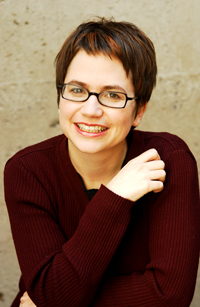Beyond Grey Hair and Wrinkles
 In studying aging women, Trent University's Dr. Sally Chivers went beyond grey hair and wrinkles. In fact, she looked beyond the aging body altogether, and realized there's more than meets the eye.
In studying aging women, Trent University's Dr. Sally Chivers went beyond grey hair and wrinkles. In fact, she looked beyond the aging body altogether, and realized there's more than meets the eye.
"If you only talk about the body, you end up playing into misconceptions promoted by popular culture," says Prof. Chivers, who joined Trent's Canadian Studies department in 2003.
Having read Margaret Laurence's The Stone Angel and Hiromi Goto's Chorus of Mushrooms, Prof. Chivers believed that literary representations of aging were, in fact, more encouraging than what popular images of aging faces would have us believe.
"Those representations give us a better idea of what aging is all about," says Prof. Chivers. "They show the potential for rethinking and reimagining late life."
So as her Ph.D. candidacy project at Montreal's McGill University, she began the research for a dissertation comparing and contrasting Canadian fiction by women about women. Three years after completing the dissertation and two post-doctoral fellowships later, the project became a book - From Old Woman to Older Women: Contemporary Culture and Women's Narratives.
Coincidentally, Prof. Chivers received the first copy of this, her first book, last fall - the day she was oriented as a new Trent faculty member. Intended for academic audiences, the book explores what Prof. Chivers calls "constructive" representations of aging. She says she worked to avoid the replication of stereotypes and negative or narrow positive depictions.
"The book mixes ideas that the body does change with the fact that there is a lot of good and a lot of creativity that can come out of that," says Prof. Chivers, who says her interest in aging was sparked after her first reading of The Stone Angel. "I was really interested in the book when I was a teenager; it changed the way I thought about aging. I thought, 'there's more going on inside this person than meets the eye'."
From Old Woman to Older Women is divided into three sections based on where women live when they can no longer live alone, including with family, in a nursing home and as part of a community of elderly women. Prof. Chivers' research was diverse and included talking to her long-living grandmother as well as a look at feminist writing on motherhood. Nursing textbooks were used in her exploration of nursing home care in Canada while narrative theory was the basis for research on interdependence.
The research for From Old Woman to Older Women gradually steered Prof. Chivers toward a new area of study, as she was invited to make a presentation based on her book at a women's studies conference focused on women and girls with disabilities. Now, her research is focused on the meeting of the physical, the social and the cultural, as she examines "the problem body" within the realm of disability studies - an emerging discipline. Her next project will focus on Canadian cultural representations of disability, including the commemoration of Terry Fox and the way the media dealt with the cases of Tracy Latimer and Sue Rodriguez.
Related to this research, Prof. Chivers will be teaching a course that will provide an introduction to disability studies, in September 2004. 'Dynamics of Difference: Gender, Disability and Canadian Cultural Representations' will be Trent's first course offering in this developing discipline and will include Canadian case studies, among them, a look at the Alberta Eugenics Board in operation from 1929 to 1972. This summer, Prof. Chivers will participate in the Summer Research Institute 'Disability Studies and the Legacies of Eugenics' at the Einstein Forum at the University of Potsdam in Germany. Many technologies used during the Second World War were promoted by medical practitioners and perfected through prior use on people with disabilities in Germany, explains Prof. Chivers.
"So disability is also an important focus for scholars of eugenics, who tend to focus more on race," she adds.
Funded by DAAD - German Academic Exchange Service - 13 scholars from the United States, Canada, Germany and Australia, with expertise in disability studies, German culture, and/or disability history will participate in the research institute. The scholars will visit two psychiatric institutions - Bernberg and Hadamar - which were sites of medically-sanctioned killings during the war; there, they will study archival materials.
"The thinking behind Nazi eugenic practices was present and even formulated in North America," says Prof. Chivers. "Canadians, especially in Alberta, played an important role... I will offer a Canadian perspective to the institute and certainly my research and teaching will benefit from a stronger historical and theoretical background."
Posted May 13, 2004

